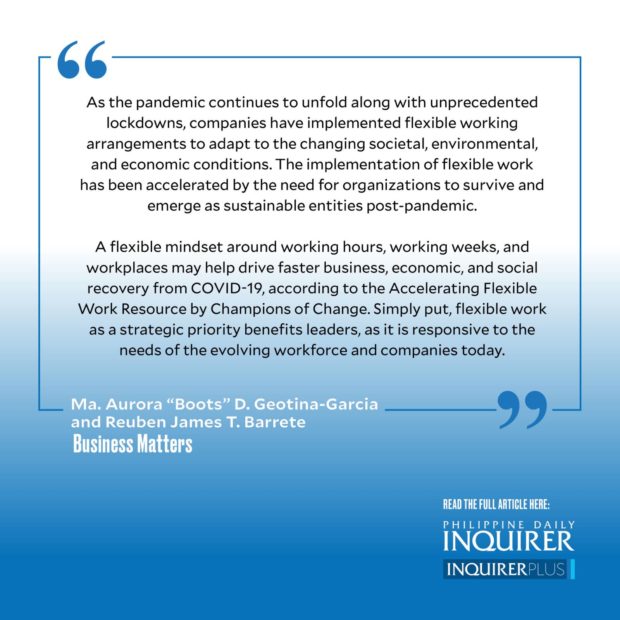Flexible work for sustainability and growth

As the pandemic continues to unfold along with unprecedented lockdowns, companies have implemented flexible working arrangements (FWA) to adapt to the changing societal, environmental, and economic conditions. The implementation of flexible work has been accelerated by the need for organizations to survive and emerge as sustainable entities post-pandemic.
A flexible mindset around working hours, working weeks, and workplaces may help drive faster business, economic, and social recovery from COVID-19, according to the “Accelerating Flexible Work Resource” by Champions of Change. Simply put, flexible work as a strategic priority benefits leaders, as it is responsive to the needs of the evolving workforce and companies today.
Last July 22, Male Champions of Change Philippines (MCC PH) organized the executive roundtable “The Flexibility Pledge: CEOs Mainstreaming Flexible Work for Sustainability.” Leaders have a critical role in promoting flexible practices within and beyond their organizations to solidify their commitment to and support for their people, and to work toward ensuring inclusivity. Every company operates differently; likewise, the effectiveness of flexible working practices will vary from one company to another, and one must be prepared to lead in innovating creative arrangements that will be most beneficial to companies and their particular circumstances.
Kathy Mulville, business partnerships director of Investing in Women by the Australian Government, emphasized the need for companies to be flexible and adaptable in finding alternative ways of working, to deliver impactful results in a radically changing environment.
Flexible work is focused on providing people the adaptability to arrange and adjust their work according to their circumstances. The more employees are enabled and given the autonomy and flexibility to deliver their work, the more engaged and motivated the workforce will become. Strategies need to be backed with a consistent flow of communication. Listening to the workforce to align both the company and the employees’ needs are big factors in transitioning to flexible work.
Kelvin Ang, CEO of AIA Philam Life, highlighted compassion as a driving force in enabling organizations to continuously think of ways to help employees care for both their personal and work responsibilities. “At the end of the day, it does not matter which industry. People are the core of organizations; if an organization does not have the right talent and engaged people, they will not be able to keep up with the changing world of work,” he said.
Equally important was the point shared by Shell Philippines president and CEO Cesar Romeroʍthat carefully reviewing performance and measurement is a vital component of flexible work, where trust, performance, and communication are key elements for effective implementation. Developing a culture that sets output-based targets equally and ensuring that the right gender-balance lens is in place promote the impact and sustainability of flexible work.
“FWA is for survival,” stressed Romero. “It is the wave of the future which has already started. Generations change and it cannot be addressed with traditional work approaches, otherwise you will not get quality employees. Live with the belief and the trust that this is how work should be done.”
Shell Philippines is able to sustain stable KPIs and has not seen a decline in performance. In AIA Philam Life, there has been better productivity since implementing FWA. As manifested by these business leaders, flexible work calls for companies to deviate from and modernize their traditional ways and attitudes toward working to become an employer of choice in the post-pandemic world.
Flexibility as a business strategy is key to smartly adapt and thrive in the evolving working environment. Engaging in conversations through platforms such as MCC helps leaders and CEOs see the best practices taking place, and enables them to choose what works best for their company. For some, flexible work practices were born out of a short-term necessity, but for the majority, it will prevail as a strategic tool that ultimately contributes to the company’s success.
The future of work is here. We must learn to adapt and start reimagining the post-pandemic workforce and how it would benefit us all.
——————
Ma. Aurora “Boots” D. Geotina-Garcia is co-convenor of Male Champions of Change Philippines, co-chair of the Philippine Business Coalition for Women Empowerment, and chair of the Philippine Women’s Economic Network. Reuben James T. Barrete is program director of Male Champions of Change Philippines.
——————
Business Matters is a project of the Makati Business Club (makatibusinessclub@mbc.com.ph)




















